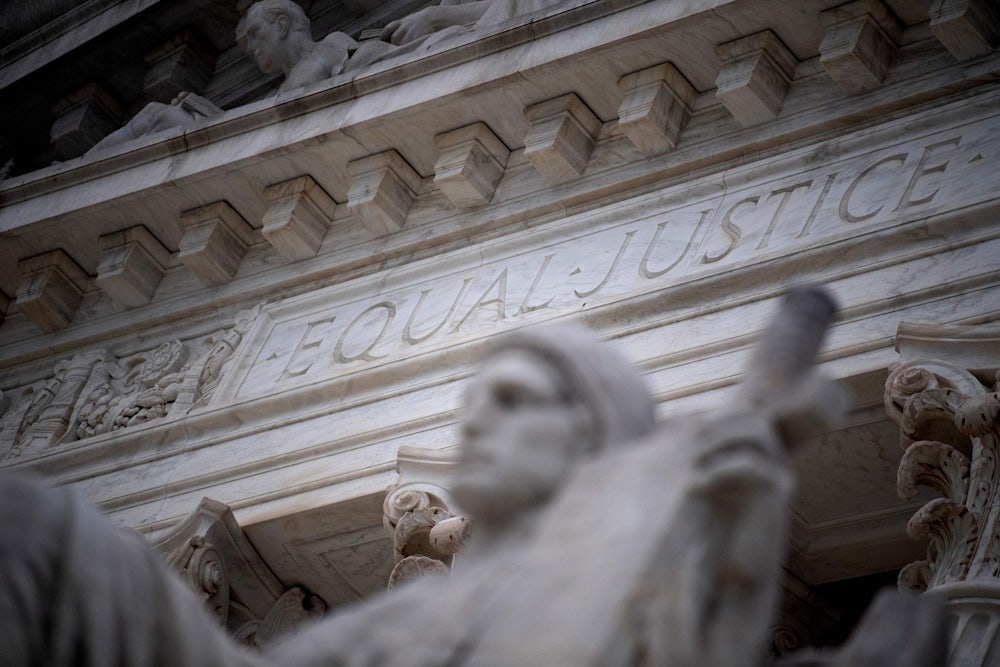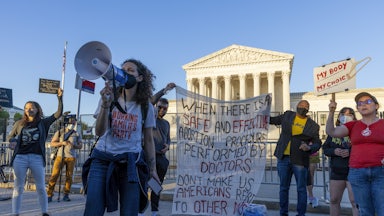Imagine that you are arrested tomorrow and charged with two separate crimes. You put up a robust legal defense and even manage to persuade the jury that you didn’t commit one of them. Then you go to the sentencing phase for the other offense. You might think that you can only be sentenced for the crime that you were convicted of, not the one for which a jury acquitted you. You would be wrong—but hopefully not for much longer.
Judges often consider outside factors when deciding whether to raise or lower a defendant’s sentence. Under a practice known as acquitted-conduct sentencing, however, judges can increase a defendant’s sentence based on conduct for which they were acquitted by a jury of their peers. One does not need to be a Sixth Amendment scholar to see issues of fundamental fairness that this could raise. Now the Supreme Court is poised to take up a case that could end the practice forever.
The case, McClinton v. United States, began with the 2015 robbery of a CVS in Indianapolis. Federal prosecutors charged Dayonta McClinton and five other men with stealing a handful of prescription narcotics from the pharmacy; a time-lock safe prevented them from obtaining even more. One of the robbers, a man named Malik Perry, was shot in the back of the head at point-blank range, purportedly for refusing to share the meager spoils with his associates.
Prosecutors claimed at trial that McClinton had been the one who pulled the trigger. Jurors were unpersuaded. Multiple witnesses testified that McClinton and Perry were “best friends,” and one of the prosecution’s own witnesses said they were “like brothers.” The evidence against McClinton came solely from testimony by three of the other robbers, who had pleaded guilty and obtained reduced sentences in exchange for their testimony against McClinton. According to McClinton’s petition for review, one of those witnesses—who testified that McClinton had confessed to killing Perry during a dice game—also acknowledged that McClinton had been “two-timing” him with the witness’s girlfriend at the time.
Against this murky factual backdrop, the jury convicted McClinton of two charges related to the robbery but acquitted him on two charges related to Perry’s murder. A pre-sentencing report by the probation office initially concluded that McClinton’s convicted offense and his personal history would fall within a sentencing range between 57 and 71 months in prison, or roughly four to six years. At prosecutors’ urging, however, the judge agreed to include Perry’s murder in the calculation, bringing it to a range of 27 years in prison at the lower end and life imprisonment at the highest end under the federal sentencing guidelines.
The judge ultimately handed down a 19-year prison sentence for McClinton, citing his age and other factors when reaching the downward sum. That term still more than tripled what would have been given under the original range before adding McClinton’s acquitted conduct. It also far outstripped what the other robbers received, including the ringleader who had orchestrated it. McClinton appealed the sentence to the Seventh Circuit Court of Appeals, arguing that the use of acquitted conduct at sentencing violated his Fifth Amendment rights to due process and his Sixth Amendment rights to a jury trial.
A three-judge panel at the Seventh Circuit rejected that argument by citing United States v. Watts, a 1997 Supreme Court case. It involved a defendant who had been convicted of cocaine possession and also acquitted of possessing a firearm in relation to a drug offense. Even though the jury had acquitted Watts on the firearm offense, the judge still cited Watts’s possession of the firearm to increase his prison term during the sentencing phase. The Ninth Circuit Court of Appeals tossed out that sentence for violating the Seventh Amendment’s double jeopardy clause.
On appeal, the Supreme Court overturned the Ninth Circuit’s ruling in an unsigned opinion. The justices held that the Seventh Amendment “does not prevent a sentencing court from considering conduct underlying the acquitted charge, so long as that conduct has been proved by a preponderance of the evidence.” Unusually, two of the justices—John Paul Stevens and Anthony Kennedy—dissented from the unsigned opinions, with both noting that acquitted-conduct sentencing could be unconstitutional on other grounds.
The Watts ruling nonetheless allowed judges across the country to hand down longer sentences for defendants based on something for which a jury had acquitted them. McClinton noted that Watts’s apparently limited scope had been stretched to cover the rest of the Constitution. “Lower courts—including the Seventh Circuit in this case—have long misinterpreted Watts to foreclose all constitutional challenges to the use of acquitted conduct at sentencing, including under the Fifth Amendment’s due process clause and the Sixth Amendment’s right to trial by jury,” he told the justices.
The Justice Department, in its own filings, urged the court not to take up the case and leave the status quo intact. It also claimed, somewhat strangely, that McClinton wasn’t sentenced based on acquitted conduct at all. The two counts for which he was acquitted were robbing Perry and causing his death during the course of the robbery. The latter charge is distinct from an acquittal for homicide, the government claimed.
“Both counts required the jury to find that petitioner attempted to rob Perry, and acquittal on those counts thus could have reflected only a finding by the jury that ‘[McClinton] did not attempt to rob Mr. Perry, that he just shot him,’” the Justice Department argued, quoting from court filings. “A finding that petitioner actually killed Perry is therefore compatible with the jury’s verdict.” That perspective might actually be more troubling, however. If it is problematic to triple a defendant’s sentence based on acquitted conduct, it surely must be worse to do it based on something for which they weren’t even properly charged and tried.
Even the Seventh Circuit itself, however, seemed uncomfortable with the outcome. Judge Frank Easterbrook, a prominent conservative jurist, all but signaled the justices to take up the matter in his majority opinion. “Despite this clear precedent, McClinton’s contention is not frivolous,” he wrote for the three-judge panel. “It preserves for Supreme Court review an argument that has garnered increasing support among many circuit court judges and Supreme Court justices, who in dissenting and concurring opinions, have questioned the fairness and constitutionality of allowing courts to factor acquitted conduct into sentencing calculations.”
Easterbrook’s reference to Supreme Court justices was a nod at a dissenting statement written by Antonin Scalia in 2014. In Jones v. United States, the court declined to review a lower court decision that would have allowed it to reconsider acquitted-conduct sentencing under the Sixth Amendment instead of the Seventh. Scalia, joined by Justices Ruth Bader Ginsburg and Clarence Thomas, said they should have heard the case, pointing out that the court finally had a non-hypothetical example before it. “This has gone on long enough,” he wrote.
Another justice who may be unfavorable toward the practice is Justice Brett Kavanaugh. While serving on the D.C. Circuit in 2018, he dissented in a case involving acquitted-conduct sentencing on unrelated grounds. At the same time, he nodded toward the inherent flaws with acquitted-conduct sentencing while noting that he was bound by precedent as a lower court judge.
“In that bifurcated system, a district court may find that the defendant engaged in certain conduct even though the jury acquitted the defendant of engaging in that same conduct,” Kavanaugh noted, referring to using one legal standard for jury convictions and another for judicial fact-finding at sentencing. “If that system seems unsound—and there are good reasons to be concerned about the use of acquitted conduct at sentencing, both as a matter of appearance and as a matter of fairness—Congress and the Supreme Court may fix it, as may individual district judges in individual cases.”
While some lawmakers have proposed fixing the issue through legislation, Congress has yet to pass legislation to restrict or ban it. The U.S. Sentencing Commission is also considering changes to the federal sentencing guidelines that would limit acquitted-conduct sentencing in some forms in federal cases. McClinton told the court that those modest proposals should not prevent it from addressing the underlying constitutional issue, which is much broader and much more urgent. He instead aptly quoted from Scalia’s dissent nearly a decade earlier: “This has gone on long enough.” The court will announce in the coming months whether it will take up the case—and, perhaps, whether it agrees.










